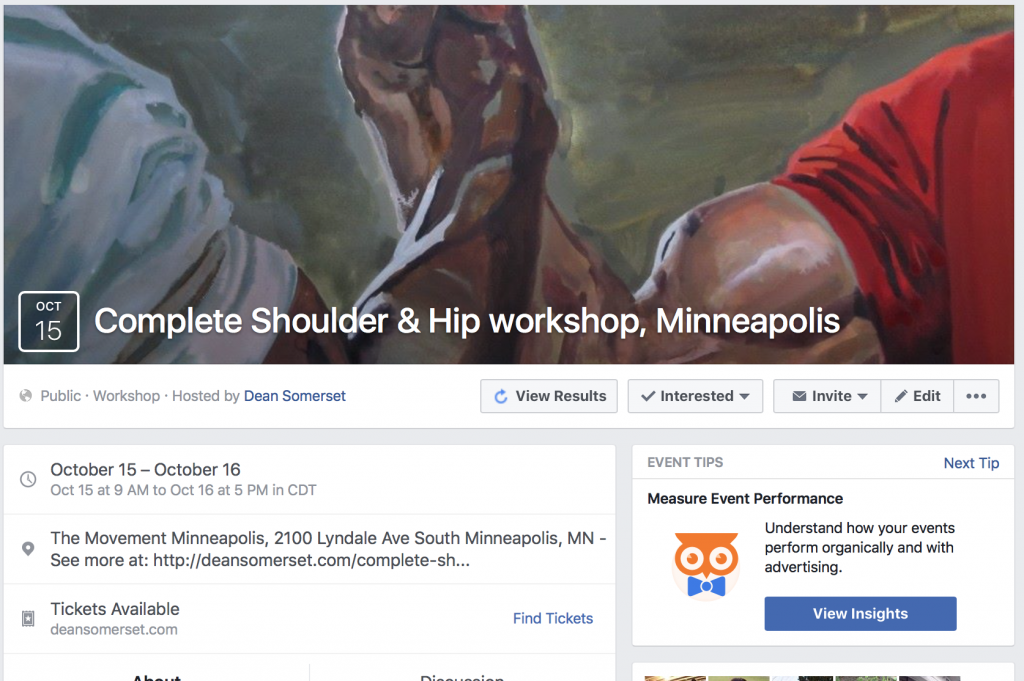How to Teach Workshops to Leverage Your Skillset
This weekend I’m in Minneapolis with Tony Gentilcore, teaching the last scheduled instalment of Complete Shoulder & Hip Blueprint before Tony stops sleeping entirely becomes a father. We have a group 0f 50 fitness professionals in the room, and to say we’re stoked to teach would be an understatement.
Tony and I have co-taught probably about 16 events together in cities all over North America and even through Europe a handful of times, and each time we present, it gets a little better and more fluid.
Between my own clubs continuing education and paid workshops like this, I’ve probably stood in front of a room of people around 200 times over the span of 12 years, so in terms of experience, I’m doing okay. What these events have taught me is that speaking is a skill that can be developed, but also that hosting workshops can be a very beneficial way to share your skillset and expand your own abilities significantly, and I want to show you how to do that. This isn’t a fitness post, but I’m sure you have something you do that could be beneficial enough where someone somewhere would be willing to pay a fee to learn from you how to do that thing better, or just to see you do it like the champ you are.
Now one thing that I should put out there, I never felt like this was something I had to do. I just kind of fell into it. I went through the normal emotions of “I’m not good enough to do this” and that kind of stuff, but I always figured the best in any field didn’t start out that way. They started in a position like mine, thinking they weren’t ready or good enough. They had to make a decision to do it, and they found a way to be exceptional, so I was no different. I had to get my head around putting myself out there.
One of the biggest hurdles to teaching workshops is the actual act of speaking in public. It’s consistently rated as one of the biggest fears people have, sometimes ahead of death itself. This fear is going to keep a lot of people from even starting the process, let alone delivering a meaningful presentation that has attendees leave with new knowledge and skills of their own. I can’t really help someone overcome that fear, but much like any fear, a lot of the time the event is built up in the individuals mind as an entirely negative thing, to a far greater extent than it actually is.
Now why would you actually want to teach a workshop Odds are you’re probably good at something. What ever it is, you’re likely better than average. Are you the best in the world at that specific thing? Even better. You don’t have to be the best to teach others how to be better. I’m not the world record holder for a deadlift, but I can coach the hell out of it to help someone become better. Maybe you’re not really good at something, but have a unique perspective on that thing. That’s cool too.
This specific skill means that you have the ability to show others how to become better at that specific skill. Additionally, if you have a unique take, maybe you’ve found some novel solutions to common problems that could help someone out. These are valuable to anyone who is looking to get better at or view something in a unique manner.
This specific value is likely shared by a number of people, not just you. I am pretty sure if someone was insanely passionate about coffee that they could host coffee workshops at different centers around the continent where they discuss different growing and brewing concepts, show barista skills and explain how to make coffee art and would likely sell out everywhere they went. If anything, staff training opportunities exist everywhere, but also there’s a metric ton of coffee enthusiasts who would be all over that shit.
Your workshop could become the go-to educational resource for baristas everywhere, and they would have to get certified with your company to be able to do anything with coffee. It’s a stretch, but you get the point.
There’s a lot of potential for educational workshops, but even more for experiential workshops. You could do yoga in the Rockies, learn trapese work from Cirque du Soliel performers, attend hockey camps with NHL legends, and everything in between. If you could offer a cool experience it would make the value added proposition even better.
So once you decide on content and what kind of experience you’re looking for, you’ll need to look at the specific details of workshops, like when, where, and what. The biggest details for these are going to be how will you have the greatest ability to get more people into your workshops. Hosting something on a Tuesday morning in a remote location is likely not going to be a high valued selling proposition, whereas a more available time like a weekend, in a bigger centre, and in a unique or cool venue will have the greatest buy in possible. Understand who you’re going for and when they would most likely be available is a massive consideration.
I have a client who runs culinary tours all over the world. She works with a travel agent to handle the bookings, and then also brings everyone gifts of cooking aprons and small stuffed animals to act as mementos of their specific trip (a kangaroo for Australia for example). The tours focus on the “farm to table” element, with attendees touring farms to see how they grow the food, wineries to see how they make their specific brands and styles of wine, different marketplaces, and awesome restaurants for an overall unforgettable experience. Check her out at Seasoned Solutions.
If you’re looking to do staff training for a facility, it would be reasonable to think the staff would be able to train during their workweek and have their employer pay them a wage versus coming in on their weekend for no pay. Each situation is different.
Next, you’ll need to find a facility to host your event. This can be tricky, as some of the facilities are businesses that would need to either shut down entirely or block off time or space for you to host your event. This means they’re losing potential business, meaning they will have to decide whether to charge you to use the facility, or volunteer it to you in exchange for having their staff attend for free or a steep discount.
For instance, in past events I’ve worked with a variety of facilities that would either require a per diem fee for the entire venue, regardless of how many people attended, another facility that asked for a per head registration fee for all attendees, and those who volunteered the facility and only asked for a couple staff members to attend.
Each situation presents different benefits and challenges. For the set rate, that can work very well if you’re looking to have a very large attendance, but will cut into your bottom line significantly if the attendance isn’t high or if the cost per attendee isn’t high. For a per head fee, it’s fine if the cost the attendees pay is high (having a $50 per head fee is fine if you’re charging $899 for a 2 or 3 day workshop, but it’s a pretty big hit if you’re charging $99 for a one day), and free is obviously best in terms of your bottom line, but might not be an option floated out to you all that often unless they approach you to teach at their facility.
In any case, ask what would work for them to host, and then either negotiate or weight the pros and cons of their offer. If it’s not something that will benefit you, don’t be afraid to say so, and if need be walk away.
I’ll give you an example. A facility owner reached out to us saying he’d love to have Tony and I come teach a workshop at his place, but said since he was a new gym owner and he would be shutting down the facility on the weekend, it would be a big financial hit to him. In order to recoup the money he would have made over those 2 days, he asked for $7,000 per day as a facility fee.
First, as a new facility, he’s definitely not clearing $7,000 a day on weekends, unless he’s running through 100 people a day at $70 a session in groups, so that’s not likely the case and he’s looking to profit from the venture. Second, in most cases, the total income generated from a workshop where the cost is $400 and 40 people sign up would be $16,000, but then you have to subtract payment processing fees for online signup, travel and hotel costs, and continuing education costs, meaning to host there we would be losing money unless we managed to get 80 people paying $400 a piece to be there.
We declined their offer. However, we found an individual who owned a gym not too far from that location who would allow us to come and teach, and just asked that 5 of their staff attend for free.
Hmmm, $14,000 in facility fees, or $0? Tough choice.
So once you have a place to host an event, you have to find a way to collect payments. You have so many options available for this with the evolution of internet technology that it’s an insanely simple concept to use. For something like Paypal, you just create a payment button and input it into a webpage.
If there’s other payment options you want to go for, you absolutely can. I would recommend not looking at taking payment at the time of the event as there’s going to be enough stuff going on that someone will get lost in the shuffle and either not pay, or if they pay by check and the check bounces, then you have to chase them for that payment again.
One option that I’ve found great success with is using an instalment payment plan, which is easy to set up on Paypal. This allows the registrant to pay for the course in multiple smaller payments versus one large sum. There’s no real cost difference for this, but you could work in a small difference where they would save money in the lump sum. It’s up to you.
With any service, there’s typically going to be a payment acceptance fee. Paypal charges around 3% of the total value being acquired, so make sure you budget for that accordingly. You can also do things through websites like EventBrite as well, with the added benefit of them tracking registration and setting up all of the backend reports. If you can enter information into an excel file, you can do it on your own, but it’s nice to have someone do the unnecessary work for you, especially if you’re planning a bigger event.
So you have an idea, you have it organized and ready to go, you have an appropriate facility to host the event, and have payment set up in place. You’re good to go, right?
Well, now you need to get people to come, and that’s where marketing comes in to play.
Before I started teaching workshops that weren’t a part of my clubs continuing education calendar, I started a blog and started putting out content in the form of written and video information. This helped me to build up a network of people who were interested in stuff I had to say, and also allowed me to form some kind of value to the people tuning in to the point they would be comfortable spending money on something where I stand and talk and show cat memes.
Seriously, probably a good 60% of any presentation I do is memes or pop culture references.
So because I’d laid this ground work, when I started announcing workshops in different places, people who had known of the kind of content I was putting out and could be interested in that sort of thing had me on their radar. I’d formed an existing relationship in some way with them, and they were willing to swing by and see what I was doing. If I hadn’t done that to begin with, I would likely not catch the interest of the people I was trying to get to show up, so if you’re looking to do any kind of workshop, have information available to showcase your skills or expertise so that people are able to decide that you’re good at what you do and they should swing by to see you do stuff in real life.
Admittedly, a big benefit from the marketing perspective was partnering with Tony for a lot of workshops, as he has a bigger social media presence than I do, which means collectively our reach was pretty substantial compared to just me or him by ourselves. From here we also worked on Facebook ads targeting the geographical regions we would be in, as well as occupations and interests of people who would want to come to something like that.
We also had a lot of word of mouth marketing from the events we would be hosting at promoting the event, other people looking to attend sharing that we would be there, and also people sharing statuses we put up about the events to say either that they were going, wished they were going, or knew of someone they thought should go. All of this was again because we’d put in work building up the reputation beforehand to have people want to share the events with others.
A good consideration is that for every 100 people within a given area that may be interested in your event, there’s probably going to be 1-3 people who actually put down money for it. Everyone has different schedules, availabilities, and interests, so someone who may want to go may have another obligation. Another consideration is when those people may register for an event. I’ve found in the fitness industry, people tend to register as early bird rates come to an end, and then within only a couple of weeks from the event. This means you may have a couple of sleepless nights wondering if anyone is going to come at all, and you’re only 8 weeks from the event, but then wake up to 10 registrations that all happened overnight.
Contacting registrants can be a big deal as well. For one, reaching out after you have a confirmed registration helps to make sure all of the details they have sent you ahead of time are correct (email address, mailing address if needed, etc), especially if you need to contact them closer to the date of the event, but also gives them a chance to ask questions or clarify details if needed. You can do mass email blasts to everyone who has registered with pertinent info, or have people received a canned email from the point of registration.
This also gives you the opportunity to provide any notes, recommended resources, etc. If you’re holding a small workshop with a lot of handouts, it may be costly to produce the handouts yourself, especially if you’re doing colour pages for everything. If you charge a decent amount, it would be expected that you would provide not only the handouts, but likely also other items, like small snack foods, maybe a t-shirt, or product you’re using or working with. If you want to keep note printing costs down, having a file accessible from somewhere like Dropbox can be very helpful, as the participants can download and print them off, or simply pull them up on a computer or tablet as needed.
So now to recap: you have an idea, a venue, a payment system, and people coming through to see you. Awesome! Now you just have to do the hard part: put on an amazing experience for the people who show up. This is going to take practice and a lot of patience. Everyone is different, and will like or hate different things about what you do. One of the best things you could use as a practice is feedback forms after the event is done. Ask about what they liked, didn’t like, what you could do better, cut out, add in, etc. This will help make you better at what you do, while also identifying potential problems with your systems and processes for hosting such events, and can help make this an easier process in the future.
Hopefully this was beneficial, and if you’ve ever thought about hosting your own workshops, it can act as a catalyst to doing so. You have skills or talents that someone would likely want to learn, so now all you have to do is pull the trigger and put yourself out there.
If that’s not your thing, that’s cool too, but maybe this can be a good resource for you or anyone you know who might want to eventually do something like this as well.



One Response to How to Teach Workshops to Leverage Your Skillset